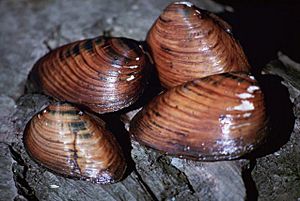Clubshell facts for kids
Quick facts for kids Clubshell |
|
|---|---|
 |
|
| Conservation status | |
| Scientific classification |
|
| Kingdom: | Animalia |
| Phylum: | Mollusca |
| Class: | Bivalvia |
| Order: | Unionida |
| Family: | Unionidae |
| Genus: | Pleurobema |
| Species: |
P. clava
|
| Binomial name | |
| Pleurobema clava (Lamarck, 1819)
|
|
| Script error: The function "autoWithCaption" does not exist. | |
Script error: No such module "Check for conflicting parameters".
The clubshell (scientific name: Pleurobema clava) is a special kind of freshwater mussel. It is an aquatic bivalve mollusk. This means it is a soft-bodied animal that lives in water and has two shells. Clubshells belong to the family called Unionidae, which are also known as river mussels.
What is a Clubshell?
Clubshells are small, shelled animals that live at the bottom of rivers and streams. They are a type of mussel, which is a mollusk with two hinged shells. These shells protect their soft bodies inside. Clubshells can live for a very long time, sometimes up to 50 years!
Where Do Clubshells Live?
Clubshells are found only in the United States. This means they are an endemic species. They like to live in clean rivers and streams that have loose sand and gravel at the bottom. They bury themselves in this material, sometimes as deep as four inches.
In the past, clubshells were found in many places. These included the Ohio, Cumberland, and Tennessee River systems. They also lived in areas that drain into Lake Erie.
Today, clubshells are much harder to find. You can still find them in some parts of Illinois, Indiana, Kentucky, Michigan, New York, Ohio, Pennsylvania, Tennessee, and West Virginia.
Why Are Clubshells Endangered?
Sadly, the clubshell is an endangered species. This means there are very few of them left, and they are at risk of disappearing forever. There are a few main reasons why clubshells are in danger:
- Pollution: Water pollution from farms and factories hurts their homes. This pollution can come from things like farm chemicals or waste from industries.
- Invasive Species: Another big problem is the zebra mussel. Zebra mussels are an "invasive species." This means they are not native to these areas and can take over. They compete with clubshells for food and space, making it hard for clubshells to survive.
Protecting the clubshell is important. It helps keep our rivers and streams healthy for all living things.
See also
 In Spanish: Pleurobema clava para niños
In Spanish: Pleurobema clava para niños
 | May Edward Chinn |
 | Rebecca Cole |
 | Alexa Canady |
 | Dorothy Lavinia Brown |


